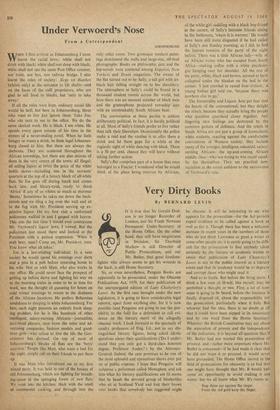Under Verwoerd's Nose
From a Correspondent
JOHANNESBURG
WHEN I first arrived in Johannesburg I soon learnt the racial laws : white shall not drink with black; white shall not sleep with black; white shall not use the same Post Office counter, nor train, nor bus, nor railway bridge. I also learnt the rules of society : Slegs vir Blankes (whites only) at the entrance to lift shafts—and on the faces of the cafe proprietors, who are glad to sell food to blacks, but 'only to take away.
If all the rules were kept, ordinary social life would be hell; but here in Johannesburg, those who want to live just ignore them. Take Joe, who sits next to me in the office. We do the same clerical work. He is black. I am white. He spends every spare minute of his time in the stream of a never-ending novel. When he feels hungry or wants a drink, he finds legal Johannes- burg closed to him. But there are always the shebeens. They are scattered throughout the African townships, but there are also dozens of them in the very centre of the town; all illegal; all selling liquor at twice the price of the white bottle stores—including one in the servants' quarters at the top of a luxury block of all-white fiats. So Joe goes off during lunch and comes back late, and bleary-eyed, ready to shout 'Africa' if any of us whites so much as murmur 'Bantu.' Sometimes he takes me down the back- streets and we sling a leg over the wall and sit in the fug with Mr. President serving up ex- pensive liquor. On my first visit a uniformed policeman walked in and I gasped with horror. This was the last time I would ever contravene Mr. Verwoerd's liquor laws, I vowed. But the policeman just stood there and looked at the President with a pained expression. Whea is mah beer, man? Come on, Mr. President, man. You know what ah takes.'
Joe is a law-abiding individual. In a sane society he would spend his evenings over darts and a pint in a pub before returning home to his wife. Not so with Matt, who also works in our office. He could never face the prospect of getting up before dawn and fighting his way on to the morning trains in order to be in time for work, nor the thought of queueing for hours on cold winter evenings to return to the drabness of the African locations. He prefers Bohemian sordidness to sleeping in white Johannesburg. For him, each night presents an entirely fresh sleep- ing problem, for he is like hundreds of other intelligent, salary-earning Africans—journalists, jazz-band players, men from the mine and ad- vertising companies, fashion models and good- time girls—who refuse to live the life the Gov- ernment has decreed. On top of most of Johannesburg's blocks of flats are the 'boys' quarters.' People like Matt, who want a bed for the night, simply call on their friends to put them up.
It was Matt who introduced me to my first mixed party. It was held in one of the houses of old Johannesburg, which are fighting for breath- ing-space in the springing forest of new flats. We went into the kitchen, thick with the smell of continental cooking, and through into the only other room. Two grotesque modern paint- ings dominated the walls and large-size, off-beat photographs. Books on philosophy, jazz and the hip-novels were scattered among Esquires, New Yorkers and Drum magazines. The owner of the flat turned out to be Sally, a tall girl with jet- black hair falling straight on to her shoulders. The atmosphere at Sally's could be found in a thousand student rooms across the world, but here there was an unusual number of black men and the gramophone projected township jazz with an unmistakably South African beat.
The conversation at these parties is seldom deliberately political. in fact, it is hardly political at all. Most of Sally's friends prefer to live rather than talk their liberalism. Occasionally the police make a raid and the routine is to offer them a drink and let them gape for a while at the , orgiastic sight of white dancing with black. There is a 50 per cent. chance they will leave without taking further action.
Sally's flat comprises part of a house that once belonged to a Fascist; I wondered what he would think of the place being overrun by Africans, of the white girl cuddling with a black boy-friend in the corner, of Sally's intimate friends sitting in the bathroom, 'where it is warmer.' He would have been still more disgusted if he had called at Sally's one Sunday morning, as I did, to finc the human remains of the party of the nighi before. There was a little African lady—wife of an African writer who has escaped from Soutf Africa—making coffee with a white psycholo. gist hanging over her shoulder. All the rest oi the party, white, black and brown, seemed to have collapsed under the blanket on the bed in th, corner. 'I just crawled in round four o'clock,' E young Indian girl told me, 'because there wat nowhere else to go.'
The Immorality and Liquor Acts put fear int( the hearts of the conventional; but they deligh the rebels, because they actually bring the peop1( who question apartheid closer together. An lingering race feelings are destroyed by tht common gesture of defiance. And the rebels it South Africa are not just a group of iconoclasti■ white students, reacting against the comfortabl■ conventions of Western society; they includ1 many of the younger, intelligent, educated, salary earning Africans—the up-and-coming Africa' middle class—who are trying to win racial equal ity for themselves. They see practical non racialism as the surest antidote to the narrownes of Verwoerd's rule.


































 Previous page
Previous page